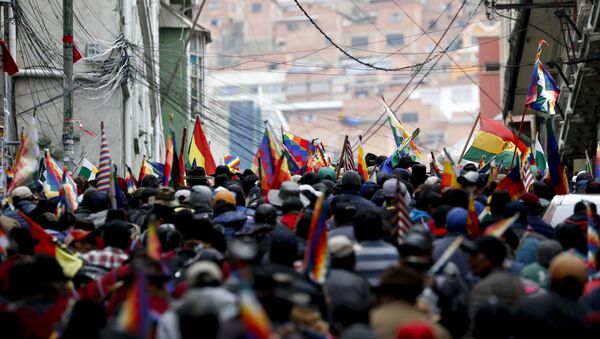On 18 October, the long anticipated snap general elections started in Bolivia. Nearly a year ago, former President Evo Morales was forced to resign over alleged election fraud following nation-wide protests triggered by Bolivian conservatives backed by the country's police and military forces.
Sputnik: How is the election process organized, in your opinion? What organisations and groups are monitoring the vote?
Alberto Echazu: The process will be organized as usual, by the electoral body and the state in general, but, given that the state is run by a de facto government of Jeanine Anez, there is nothing ordinary about the process itself. The regime has attacked international observers, specifically Spanish and Argentinian parliamentarians, calling them "agitators", showing its intentions of having the least possible number of observers. The UN, the EU and the Organisation of American States (OAS) are the main observers, along with Mercosur (Southern Common Market) and other parliamentary delegations such as the aforementioned.
Bolivians here in La Paz wake up on election day to a militarized city. In the central plazas, numerous police & troops are about with weapons & tear gas rounds at the ready. (Plaza Avaroa) pic.twitter.com/1MavGls4xq
— Ollie Vargas (@OVargas52) October 18, 2020
Sputnik: What is the chance of Luis Arce the candidate of Evo Morales' Movement Towards Socialism (MAS) winning in the first round? Earlier, the de facto Anez government put forward criminal accusations against him. Though denounced as "false", could they be used by the right-wing bloc to derail Arce's victory?
Alberto Echazu: There is a significant chance of Luis Arce winning in the first round. He is ahead in the polls and the right-wing candidacies’ campaigns are oriented towards avoiding that, signaling that it is the most likely scenario. The criminal accusations against him do not have any foundation, so they have no validity regarding the electoral process.
MAS VP candidate David Choquehuanca cast his vote in the rural Aymara town of Huarina, Department of La Paz. pic.twitter.com/x6OFkIzCWP
— Kawsachun News (@KawsachunNews) October 18, 2020
Sputnik: Will Bolivian powerful right-wing politicians, Jeanine Anez, Carlos Mesa and Luis Fernando Camacho commit to a peaceful transition of power if MAS wins the elections?
Alberto Echazu: It is difficult to imagine a peaceful transition from the coup bloc, but their own private interests have separated them even further, and even though the regime shows no intention of handing over power in a democratic way, Camacho has expressed his position of recognising whoever wins, and given that he is the candidate that is furthest to the right, he has put pressure on the de facto government to deliver a democratic and peaceful transition even if MAS wins.
Incredibly long queues outside this polling station in Sopocachi, La Paz. The Bolivian regime promised to open more voting centres to prevent crowds & reduce risk of Covid19 contagion. That clearly hasn't happened. pic.twitter.com/q9aj1w7xxs
— Ollie Vargas (@OVargas52) October 18, 2020
Sputnik: What is Evo Morales' role in the ongoing campaign?
Alberto Echazu: Evo Morales is the chief of campaign (campaign manager), he has been very involved with the militant bases and with the foreign press, giving information so that there is more control over possible fraud by the regime.
Sputnik: What global players and international institutions have signalled their solidarity with MAS to date?
Alberto Echazu: Parliamentarian groups from all over the world have expressed their solidarity with the Bolivian people and with MAS, including US legislators headed by Democrat Bernie Sanders, the previously mentioned Argentinian and Spanish congressmen, human rights institutions from Latin America and notorious political figures like Gustavo Petro, former Colombian presidential candidate, and many others.


